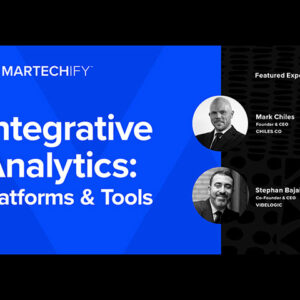Adtech Platform Comparison: What You Need to Know
- Ascend Marketing
- Campaign Optimization, Media and Adtech Optimization
Despite the many changes caused by the pandemic, digital advertising revenues continued to grow through 2023 according to this IAB ad revenue report. This may be because advances in advertising technology, or adtech, have given ad agencies greater freedom to quickly create responsive, engaging campaigns.
Adtech, put simply, is the software and technology platforms that allow advertisers to execute digital advertisements, target specific audience segments, obtain market information, and gain valuable insights on ROI. The foundation of adtech is the campaign, which includes digital advertisements as well as the data surrounding ad interactions, such as user information and number of ad impressions.
Adtech platforms were designed to give advertisers the platform and capabilities necessary to create, execute, track, and manage digital advertising campaigns. These platforms have evolved to facilitate the creation of content that maximizes revenue and enhances user experience by analyzing and responding to consumer behaviors. Consequently, in the past decade, ad content has become more integrated, multimedia-rich, and shareable than ever before.
Today there are countless adtech platforms available to marketers and advertisers alike, and integration of various analysis tools allows for a dizzying amount of customization options to suit any campaign. The global AdTech market size was valued at USD 987.52 billion in 2023 and is expected to grow at a compound annual growth rate (CAGR) of 16.1% from 2024 to 2030.
Adtech offers advertisers not only the ability to buy and sell advertisements, but the ability to show advertisements to users based on their recent web actions (retargeting). These platforms allow advertisers to collect data and classify data, then apply it to targeted advertisement options.
Ascend’s take on adtech
Before investing in an adtech platform, it pays to evaluate the key features and benefits on the market. Organizations need to align their purchases with their campaign goals to achieve the right balance of flexibility and usability to successfully achieve their goals. For example, you may want to focus your search on platforms with a product experience feature, which tracks how users are interacting with your applications.
No matter the specific market functionality you are seeking, be sure to pay attention to integration capabilities. Some adtech platforms have native integrations with other martech, such as Salesforce, while others require you to build your own integration. It also helps to be mindful of analytics features that allow for a broad range of targeting tactics. As cookies are being phased out (read more about that), adtech platforms are scrambling to provide other tools to generate data-driven consumer insights. Organizations need to evaluate the options and determine which best meets their business and campaign goals.
Gartner’s Magic Quadrant for adtech platforms 2022
Adform FLOW is an enterprise platform that provides advanced opportunities for organizations to leverage customer data within campaigns. The platform also focuses on providing a superior user experience to enable seamless management of the whole campaign lifecycle. Adform FLOW was created to realize three key principles: operating simplicity, seamless and full identity management, and returning control to advertisers and marketers.
Key features:
- Adform Ad Server: Centralizing user interactions across valued channels.
- Adform Data Management Platform: Providing a data management platform that provides the opportunity to own & leverage that data seamlessly.
- Adform Demand Side Platform: Delivering an advanced user experience for the activation of campaigns, across channels, in real-time, backed by real data.
Amazon Advertising (formerly AMS or Amazon Marketing Services) is a service that works in a similar way to pay-per-click ads on Google: sellers only pay when shoppers click on ads (regardless of whether or not the item sells). The suite includes a robust suite of tools designed for advertisers to effectively reach and engage with Amazon’s extensive customer base across multiple channels. The platform facilitates the creation, management, and optimization of ad campaigns both on Amazon and other platforms using advanced analytics and AI/ML.
Key features:
- Amazon Advertising Console: Utilizing Amazon’s rich consumer data to deliver highly targeted ads.
- Amazon DSP (Demand-Side Platform): Extending the reach of campaigns beyond Amazon to other websites and digital platforms.
- Amazon Attribution: Offering detailed analytics that measure ad performance, track conversions, and quantify sales impact.
- Dynamic Optimization: Continuously refining campaigns using real-time data to enhance effectiveness and ROI.
Campaign Manager 360, formerly known as Google Campaign Manager, provides cross-channel ad management to maximize insights and optimize media performance across digital advertising campaigns. This solution provides advertisers with ad serving, audience creation and management, as well as advanced measurement and reporting tools. The flexibility of this platform includes countless integrations.
Key features:
- Ad Trafficking: Trafficking advertisements to align campaigns with larger goals, objectives, and timing.
- Tracking: Tracking user interactions—including conversions, transactions, and landing pages—so your organization can assign attributions across the customer journey.
- Reporting: Performing data analysis to report on insights such as cross-channel attribution and verification.
Adobe Advertising Cloud is an all-in-one technology platform that allows organizations to personalize, manage, and measure digital campaigns and customer experiences for optimized performance. The Adobe Advertising Cloud is a part of the Adobe Experience Cloud, which offers a wide range of solutions and interfaces that sync content, insights, and data across multiple channels. Adobe Advertising Cloud automates the targeting process to increase conversions and connect digital channels seamlessly. The platform offers customer journey orchestration and delivers personalized experiences.
Key features:
- Marketing Automation: Implementing marketing automation to increase campaign productivity and deliver engaging customer experiences.
- A/B Testing: Conducting A/B tests to discover which creative assets lead to an increase in conversion rates.
- Real-Time Digital Analytics: Understanding customers on a deeper level with experiential data collected from multi-channel campaigns.
- Social Insights: Monitoring social media conversations, publishing and promoting content, and analyzing conversion and engagement data.













